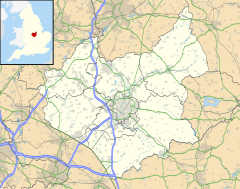Barton in the Beans
| Barton-in-the-Beans | |
|---|---|
 Entrance to the village | |
Location within Leicestershire | |
| District | |
| Shire county | |
| Region | |
| Country | England |
| Sovereign state | United Kingdom |
| Post town | NUNEATON |
| Postcode district | CV13 |
| Police | Leicestershire |
| Fire | Leicestershire |
| Ambulance | East Midlands |
| UK Parliament | |

Barton in the Beans is a hamlet in the Hinckley and Bosworth district of Leicestershire, England and forms part of the Shackerstone civil parish. There are no shops or pubs here, only a Baptist Church and a post box. It was in the 18th century an important centre for the Baptist Church and the minister at Barton was the notable clockmaker Samuel Deacon (1746-1816). The population ca. 1830 was 177.
One of the earliest mentions of this place is in the Domesday Book where it is listed amongst the lands given to Hugh de Grandmesnil[1] by the King (the land required half a plough and there were 2 acres (8,100 m2) of meadow). During the Middle Ages the land passed through many hands including several members of the family of Hastings.
Toponymy
Barton is one of many places in England with this name: both this Barton and that in Nottinghamshire were once known as "Barton-in-Fabis" but that is no longer used for the Leicester Barton.[2] In Domesday Book both are just 'Bartone' and later usage has varied (the meaning of Barton in both cases is probably 'grange' i.e. an outlying farm within an estate).
A popular saying in the county is "Shake a Leicestershire man by the collar and you may hear the beans rattle in his belly": the author John Benjamin Firth quotes this from a contributor to Magna Britannia, 1820.[3] Leicestershire was once noted for cultivating the broad bean (Vicia faba)[4] and in this way the bean has been perpetuated in place-names.
Samuel Deacon and the Barton Baptists
In 1751 six men associated with a Baptist group at Barton registered themselves as dissenting preachers under the Act of Toleration. These included Samuel Deacon. By 1759 they had established another church in Melbourne, then at Kegworth, Loughborough and Kirkby Woodhouse. Next they extended to Hinckley and Longford in Warwickshire.[5]
Deacon was from Ratby and settled at Barton ca. 1765 and set up in business as a clockmaker. Another of the Baptist preachers, Joseph Donisthorpe, was also a clockmaker[6]. Deacon's workshop was preserved by his successors and after many years of continuous use is now in the collections of the Leicester Museum. He was a leader of the General Baptists sect and the author of many works, including his autobiography.[7][8]
The Baptist church became highly influential across the region. Dan Taylor, founder of the Baptist New Connexion, found the church 'strenuous advocates' of the 'essential truths' of the Gospel.[9]
Notable residents
John Goodman (born 1765) was a Baptist preacher who hired out leeches for bloodletting. The leeches came from lakes in Cheshire and North Wales through which Goodman would wade with bare legs.[10]
References
- ^ Domesday Book: a Complete Transliteration. London: Penguin, 2003; p. 656 ISBN 0-14-143994-7
- ^ Firth, J. B. (1926) Highways and Byways in Leicestershire. London: Macmillan; pp. 420-422
- ^ Firth, J. B. (1926) Highways and Byways in Leicestershire. London: Macmillan; p. 422
- ^ Evans, Arthur Benoni (1881) Leicestershire Words, Phrases, and Proverbs. London: Trübner & Co.; p. 101, p. 299 "Bean-belly: an epithet of Leicestershire"
- ^ Goadby, John Jackson, 'Lessons for General Baptists of the Present Day', London: Simpkin Marshall, no date, p.6-7
- ^ Goadby, p.7
- ^ Nichols, John (1795-1815). History of the County of Leicester. Vol. 3. London: John Nichols
- ^ Leicestershire Clocks [and] the Deacon Workshop; compiled by the Earl Shilton Old Clock Club, 2002-05. Issue 2: 2005. CD-ROM
- ^ Rinaldi, Frank, 'The Tribe of Dan', Milton Keynes: Paternoster, 2008, p.10
- ^ Palmer, Roy (1985) The Folklore of Leicestershire and Rutland. Wymondham, Leicestershire: Sycamore Press; p.74
External links
- Map sources for Barton in the Beans
- Barton [-in-the-Beans] in the Domesday Book

